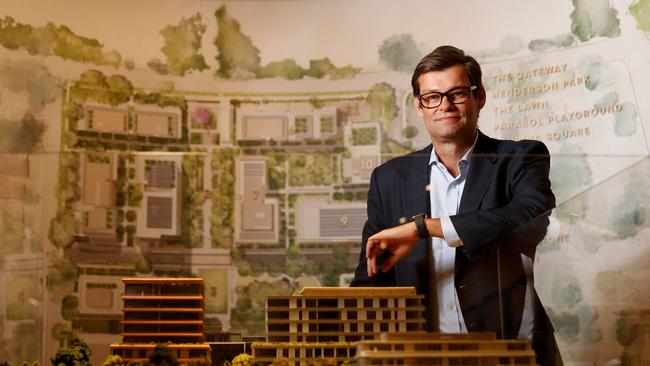Migrants could fill skill gaps during housing crisis: Mirvac
Property developer Mirvac wants increased immigration to help plug a severe skills gap alongside other urgent measures to revive the ailing building industry.

Business
Don't miss out on the headlines from Business. Followed categories will be added to My News.
Property developer Mirvac wants increased immigration to help plug a severe skills gap alongside other urgent measures to revive the ailing building industry.
The listed developer’s chief executive, Campbell Hanan, believes the housing crisis could be addressed if governments sped up planning timeframes, which had blown out to almost a decade on some sites on the outskirts of Sydney, to improve the supply and affordability of homes.
In a frank assessment of the difficulties faced by the industry, Mr Hanan said tough conditions were hitting demand for traditional house and land packages while developers were facing dramatically rising labour costs.
“You’ve got this extraordinary intake of migration which, by itself, is expansionary to housing supply. And on the other hand, you’ve got a blowout in the cost of construction through inflation,” he said.
These forces had sent a number of builders and subcontractors to the wall because they had committed to fixed-price contracts that were hit by inflation, leading to insolvencies.
“That creates a market in which it is very, very difficult to build and to find good quality builders,” the Mirvac chief said.
Further pressures have arisen due to the limited number of construction workers at a time when the country was also spending record amounts on infrastructure.
“There’s a finite pool of labour talent with which you can do that,” he said.
The “never-ending voice around nimbyism” and opposition to cities increasing population density were working against housing supply but the developer sees a solution in exploiting new transport connections in cities.
“In reality, with all the infrastructure spend that governments make, around transport in particular, it makes sense to utilise transport systems by densifying around them,” Mr Hanan said.
While there was no “easy solution” it was essential to boost the workforce. “I think the biggest challenge right now is the labour force needed to build houses,” he said. “And immigration can resolve some of that.”
Getting the settings right for an influx of migrants was critical as they had to have places to live but rental vacancies were at a historic low.
“We have an imbalance right now where we don’t have enough people in construction, which we need to meet the demands of housing and infrastructure. That in itself needs to be fixed,” he said.
“Immigration would seem like an easy solution. But then you could take it a step further and say, well, TAFE and education systems and other things can play a part as well,” he said.

Mr Hanan did not offer a firm view on immigration but pointed to the long-term benefits to the country. “Australia has been an economy that’s relied on immigration; immigration has driven great economic prosperity for Australia. So certainly I’d look at it at the moment and say that it’s been a value-add for our economy,” he said.
Mr Hanan said if unemployment increased as a result of economic slowdowns, that would be “an opportunity for people to pause and rethink”.
He sees the wider housing conversation as being determined by supply – where shortages are indicated by low rental vacancy and the pricing of existing houses – and affordability, which are different elements.
On affordability, the developer called out the importance of fixing planning, with faster turnarounds needed to lower holding costs and prices for home buyers.
But Mirvac has been a trailblazer in new types of housing. It was the first listed company to build build-to rent units and also moved into land lease estates. Both helped lift supply and were affordable options, Mr Hanan said.
“I just think we need to take a broader view of housing typology, which you’ve seen in other parts of the world,” he said. “I think the time has come in Australia where we need to do the same.”
Mirvac now sees build-to-rent as an established industry backed by global capital, and expects land lease will follow. “Those are really important elements for us to have a functional housing market,” Mr Hanan said.
The company has also pushed into affordable housing. Mr Hanan cited a Queensland government build-to-rent scheme where Mirvac was including it in a groundbreaking housing pilot. “I think that’s an interesting approach to how the government can use its own balance sheet and capital, working with the private sector to create more supply,” he said.
It could also have a broader application. “That’s something that we would encourage all governments to look at. It’s certainly cheaper than governments having to build the assets themselves,” he said.
The Mirvac chief cautioned that overall demand was somewhat subdued after a dozen interest rate rises. “We would hope that with a pause in monetary policy, that might level out the markets to the extent that demand comes back,” he said.
He predicts a market comeback driven by rising – but different – housing needs.
“The great Australian dream of owning a house, I don’t think that disappears, but I think it changes a little bit,” he said.
More people were now staying in apartments or shifting to larger apartments rather than buying houses, as in the past, Mr Hanan said.
“As people are starting to think about mortgage payments … it should make demand for apartments better,” he said.
More Coverage
Originally published as Migrants could fill skill gaps during housing crisis: Mirvac





